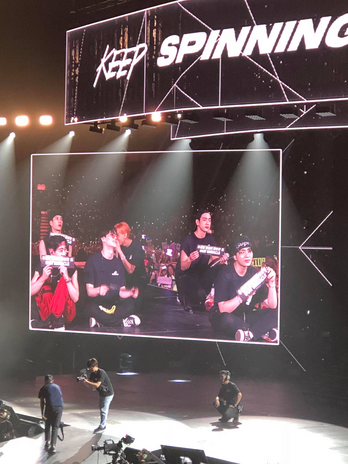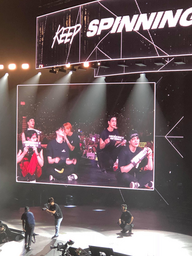
However, with this fame comes consequences — so many Western media paint Kpop in such a distressing and negative light. You must have seen over a dozen “The Dark Side of the Kpop Industry” videos everywhere. Common topics include plastic surgery, mistreatment, and dating bans. It’s also common to see the word “manufactured” associated with Kpop, conveying that all songs are formulaic and generic and that Kpop idols are extremely controlled.
While there is truth to these statements, I often find them extremely over-exaggerated. For now, let’s tackle each of these ‘ugly truths’ to really understand the true essence of Kpop!
- It’s manufactured
-
Red Velvet’s Seulgi and Irene Dancing
We’ve all heard this statement before, but it’s typically used in two different ways. Because of Kpop’s rigorous training, people infer that these stars are manufactured because they are “programmed” to sing and dance well. They say that there’s no natural talent or genuinity in them. The other assertion people make is that Kpop idols rarely get creative control and act like puppets for their company.
I find the first statement extremely over-exaggerated; the assumption that undergoing a “boot camp” translates to having inauthentic skills is just false. But the thing is, for someone to be skilled at something requires a large amount of work. Think of Beyonce; she is noted for her insane singing and dancing abilities, mainly her ability to sing and dance at the same time. Yet, for Beyonce to reach that skill level, she required years of hard work and training. Her father forced her to run and sing in high heels to build her stamina, for example. As a child, she would have vocal lessons every single day, which explains why she’s one of the best vocalists of all time. Even Billie Ellish switched to homeschooling so she could use her extra time to focus on music and perfect her craft. However, since Beyonce and Billie Ellish don’t highlight the years of training they underwent, we believe that singing and dancing are natural talents. Therefore, the idea that Kpop idols talents are ingenuine because of their insane training is completely untrue. Instead, let’s focus on their performance ability!
I also understand that since Kpop groups weren’t formed naturally but rather by a company, they lack that natural chemistry and passion that most people love about Western groups. The thing is, I find Kpop stars more admirable than Western artists because trainee life is difficult. In Kpop, people audition for a company (or perhaps are street casted) and then take singing, dancing and etiquette classes for hours everyday. Trainees can be as young as 8 years old to 18 years old and train from less than a year to 12 years. One notable example is Jihyo from Twice (who’s two years older than me!). She became a trainee at 8 years old, trained for 10 years, and almost didn’t debut. That’s what I admire so much about Kpop stars – I cannot imagine sacrificing half of my childhood and teen years for something that isn’t guaranteed.
When I was 10 years old, I gave up my dream to become a vet because I didn’t want to go to school for 8 years! To me, the drive and work ethic Kpop stars have are commendable. In terms of group dynamic, although a lot of Kpop groups don’t get along, I find compared to Western groups like One Direction or Fifth Harmony, most of them have natural chemistry. As mentioned before, Kpop idols train for years so most of them know each other before being thrown in a group. In contrast, Fifth Harmony’s members barely knew each other before their group’s formation.
One group known for their strong friendship is Girls Generation. Although they are focusing on their solo careers, they still hang out from time to time, such as member Tiffany flying to Korea every year to celebrate her birthday with them (since 2017, Tiffany moved back to her homeland of America). They have been together for almost 15 years, and most of them knew each other since their middle school ages. Therefore, Kpop groups tend to have a more natural chemistry with each other than ‘manufactured’ Western groups.
Now for the second statement: it is quite true that many Kpop companies refuse to grant creative control to their artists. One notable example is when EXO had to beg their company to let them release one of their self-produced songs. This fact frustrates me — how can you restrict creative freedom for your artists? They’re human beings who should be able to express themselves freely.
There are plenty of Kpop artists who are self-producing, such as Big Bang, BTS, Stray Kids, Got7, G-Idle and Seventeen (who choreograph the majority of their own performances, like their song “Don’t Wanna Cry”). One of the reasons why I love BTS is their beautifully crafted messages about loneliness, chasing your dreams, mental health and criticizing society’s labels. BTS is known for making concept albums; they take a topic such as self-love or troubles youth face and apply it to each song on the album. One of my personal favourites is “the Truth Untold”, which was part of the Love Yourself Trilogy. The song is based on an Italian story ‘’La Città di Esmeraldo”, in which a man hides himself in a castle due to insecurity about his looks but later falls in love with a woman who often visits his garden. The character ultimately regrets not loving himself because he lacked the courage to confess his feelings to his lover. I found this song extremely creative because they were inspired by an idea from a story. Although it is quite rare in Kpop for an artist to be self-producing, the trend is increasing with more and more companies enabling creative control.
- Idols aren’t allowed to date
-
This is a statement that actually holds some truth, which I hate to admit aloud. One of the most lucrative and successful marketing strategies in Kpop is to present an artist as a potential lover. For example, a lot of Kpop ads and music videos are shot as if the viewer is on a date with the singer. Many idols are constantly asked about their ideal “type” and how many kids they plan to have. However, some companies ban their idols from dating for a couple of years, or they tell the artist to not disclose their dating life to the public. This can explain why Kpop has such a loyal and dedicated fanbase; to many of these fans, they are supporting their idol because they truly see them as their significant other. That being said, do I find this strategy ethical? Absolutely not, because it encourages obsessive fan behaviour and even stalkers. In fact, many idols who are caught in “dating scandals” (the severity of them being equivalent to a Western star having a drug scandal) may receive public backlash from their fans, who are enraged they did not “stay loyal” to them. One of the biggest examples is when Chen of EXO revealed in early 2020 that he was getting married and his fiance was pregnant. Many EXO-ls (EXO fanbase name) were so mad, they even petitioned and protested for Chen to get kicked out. It even resulted in Chen issuing a public apology!
- Idols and plastic surgery
-
It is very common for young idols to be pressured to obtain plastic surgery. Kpop star Jessica Jung wrote in her fictional novel Shine, which is largely based on her experiences as an idol, that a trainee was kicked out because they refused to get plastic surgery. Even famous plastic surgeons and experts have analyzed whether notable Kpop celebrities such as Red Velvet’s Irene, Blackpink’s Lisa and Astro’s Cha Eun Woo have gotten surgery. The problem I have with this “ugly truth” is that many Westerners treat plastic surgery as if it is completely unique to Kpop, yet fail to acknowledge how common plastic surgery is among Western celebrities. Major beauty icons such as Angelina Jolie, Blake Lively, Priyanka Chopra, and Halle Berry have gotten tons of cosmetic work done. It’s rumoured that popular American actress Dove Cameron received her first rhinoplasty as young as 16 years old. The most common procedures among Western celebrities are rhinoplasty and blepharoplasty (removing excess fat above the eyelid to make the eyes bigger), which are the same procedures many Kpop idols receive too. So, as you can see, plastic surgery isn’t just a Kpop thing; it’s common in every entertainment industry!
- Kpop is very image-focused
-
Again, this statement is quite true! In Kpop, there are 5 group positions: leader, dancer, singer, rapper and visual. The latter refers to the member who embodies Korean beauty standards! Although I agree that the Western music industry does emphasize looks, it’s not the same as Kpop. I mean, was there an official position in One Direction or the Backstreet Boys for the most good-looking member?
It’s funny, because when I got into Kpop, I started paying attention to certain features: double eyelids, high bridge noses (it took me weeks of Googling to find out the difference between a high bridge and a low bridge nose) and even a V-line jaw. Why? Because that’s what a lot of Korean media pays attention to: either an idol has a 40-degree nose bridge or has cherry lips. Although I do believe that many Kpop idols were added to their groups because of their looks alone, that doesn’t mean they aren’t talented. With Kpop, rigorous and cutthroat training means that these idols are able to sing and dance very well. They aren’t just a pretty face.
- Kpop is an inhumane industry (Trigger Warning: Unhealthy eating)
-
This is a statement that is 1000% true and something we cannot take lightly. Kpop idols often work more than 12 hours a day and some even forgo sleeping. Many of them, especially female idols, are pressured to keep a certain weight. I think one of the most shocking cases I’ve heard of was when a manager told a Kpop idol her weight in kg could not start with a 5, despite her being 5’7. It is perfectly normal for someone to be over 100 lbs, as weight does not dictate health. However, many Kpop idols are constantly weighed and some are forced to undergo restrictive eating/extreme diets.
My main problem with this ‘ugly’ truth is it’s the only thing Westen media focuses on. Instead of looking at the positive aspects of Kpop such as performance ability, group friendship, variety shows, idols chasing their dreams, and fandoms, all of them attempt to paint Kpop as an extremely dark industry. If you’re going to report on something, you should consider both sides of it.



